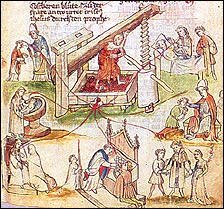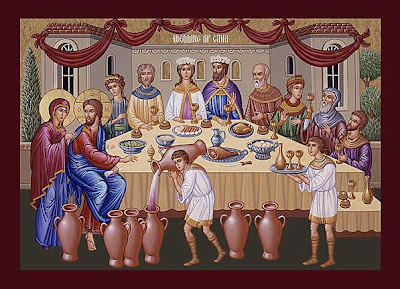Today's Gospel: John 15:1-8
I am the true vine, and my Father is the vinedresser. Every branch of mine that bears no fruit, he takes away, and every branch that does bear fruit he prunes, that it may bear more fruit. You are already made clean by the word which I have spoken to you. Abide in me, and I in you. As the branch cannot bear fruit by itself, unless it abides in the vine, neither can you, unless you abide in me. I am the vine, you are the branches. He who abides in me, and I in him, he it is that bears much fruit, for apart from me you can do nothing. If a man does not abide in me, he is cast forth as a branch and withers; and the branches are gathered, thrown into the fire and burned. If you abide in me, and my words abide in you, ask whatever you will, and it shall be done for you. By this my Father is glorified, that you bear much fruit, and so prove to be my disciples.
+++
And concerning the Eucharist, hold Eucharist thus: First concerning the Cup, "We give thanks to Thee, our Father, for the Holy Vine of David Thy child, which, thou didst make known to us through Jesus Thy Child; to Thee be glory for ever."
Didache, chapter 9
+++
The Master accordingly, when asked, "Which is the greatest of the commandments? "says, "Thou shalt love the Lord thy God with all thy soul, and with all thy strength; "37 that no commandment is greater than this (He says), and with exceeding good reason; for it gives command respecting the First and the Greatest, God Himself, our Father, by whom all things were brought into being, and exist, and to whom what is saved returns again. By Him, then, being loved beforehand, and having received existence, it is impious for us to regard ought else older or more excellent; rendering only this small tribute of gratitude for the greatest benefits; and being unable to imagine anything else whatever by way of recompense to God, who needs nothing and is perfect; and gaining immortality by the very exercise of loving the Father to the extent of one's might and power. For the more one loves God, the more he enters within God.
The second in order, and not any less than this, He says, is, "Thou shalt love thy neighbour as thyself,"38 consequently God above thyself. And on His interlocutor inquiring, "Who is my neighbour? "39 He did not, in the same way with the Jews, specify the blood-relation, or the fellow-citizen, or the proselyte, or him that had been similarly circumcised, or the man who uses one and the same law. But He introduces one on his way down from the upland region from Jerusalem to Jericho, and represents him stabbed by robbers, cast half-dead on the way, passed by the priest, looked sideways at by the Levite, but pitied by the vilified and excommunicated Samaritan; who did not, like those, pass casually, but came provided with such things as the man in danger required, such as oil, bandages, a beast of burden, money for the inn-keeper, part given now, and part promised. "Which," said He, "of them was neighbour to him that suffered these things? "and on his answering, "He that showed mercy to him," (replied),40 Go thou also, therefore, and do likewise, since love buds into well-doing.
In both the commandments, then, He introduces love; but in order distinguishes it. And in the one He assigns to God the first part of love, and allots the second to our neighbour. Who else can it be but the Saviour Himself? or who more than He has pitied us, who by the rulers of darkness were all but put to death with many wounds, fears, lusts, passions, pains, deceits, pleasures? Of these wounds the only physician is Jesus, who cuts out the passions thoroughly by the root,-not as the law does the bare effects, the fruits of evil plants, but applies His axe to the roots of wickedness. He it is that poured wine on our wounded souls (the blood of David's vine), that brought the oil which flows from the compassions of the Father,41 and bestowed it copiously. He it is that produced the ligatures of health and of salvation that cannot be undone,-Love, Faith, Hope. He it is that subjected angels, and principalities, and powers, for a great reward to serve us. For they also shall be delivered from the vanity of the world through the revelation of the glory of the sons of God. We are therefore to love Him equally with God. And he loves Christ Jesus who does His will and keeps His commandments. "For not every one that saith unto Me, Lord, Lord, shall enter into the kingdom of heaven; but he that doeth the will of My Father."42 And "Why call ye Me Lord, Lord, and do not the things which I say? "43 "And blessed are ye who see and hear what neither righteous men nor prophets" (have seen or heard),44 if ye do what I say.
He then is first who loves Christ; and second, he who loves and cares for those who have believed on Him. For whatever is done to a disciple, the Lord accepts as done to Himself, and reckons the whole as His. "Come, ye blessed of My Father, inherit the kingdom prepared for you from the foundation of the world. For I was an hungered, and ye gave Me to eat: I was thirsty, and ye gave Me to drink: and I was a stranger, and ye took Me in: I was naked and ye clothed Me: I was sick, and ye visited Me: I was in prison, and ye came to Me. Then shall the righteous answer, saying, Lord, when saw we Thee hungry, and fed Thee? or thirsty, and gave Thee drink? And when saw we Thee a stranger, and took Thee in? or naked, and clothed Thee? Or when saw we Thee sick, and visited Thee? or in prison, and came to Thee? And the King answering, shall say to them, Verily I say unto you, in as much as ye have done it unto one of the least of these My brethren, ye have done it unto Me."
Again, on the opposite side, to those who have not performed these things, "Verily I say unto you, in as much as ye have not done it unto one of the least of these, ye have not done it to Me."45 And in another place, "He that receiveth you; receiveth Me; and he that receiveth not you, rejecteth Me."46
Such He names children, and sons, and little children, and friends, and little ones here, in reference to their future greatness above. "Despise not," He says, "one of these little ones; for their angels always behold the face of My Father in heaven."47 And in another place, "Fear not, little flock, for it is your Father's good pleasure to give you the kingdom of heaven."48 Similarly also He says that "the least in the kingdom of heaven" that is His own disciple "is greater than John, the greatest among those bern of women."49 And again, "He that receiveth a righteous man or a prophet in the name of a righteous man or a prophet, shall receive their reward; and he that giveth to a disciple in the name of a disciple a cup of cold water to drink, shall not lose his reward."50 Wherefore this is the only reward that is not lost. And again, "Make to you friends of the mammon of unrighteousness, that, when ye fail, they may receive you into everlasting habitations; "51 showing that by nature all property which a man possesses in his own power is not his own. And from this unrighteousness it is permitted to work a righteous and saving thing, to refresh some one of those who have an everlasting habitation with the Father.
See then, first, that He has not commanded you to be solicited or to wait to be importuned, but yourself to seek those who are to be benefited and are worthy disciples of the Saviour. Excellent, accordingly, also is the apostle's saying, "For the Lord loveth a cheerful giver; "52 who delights in giving, and spares not, sowing so that he may also thus reap, without murmuring, and disputing, and regret, and communicating, which is pure53 beneficence. But better than this is the saying spoken by the Lord in another place, "Give to every one that asketh thee."54 For truly such is God's delight in giving. And this saying is above all divinity,55 -not to wait to be asked, but to inquire oneself who deserves to receive kindness.
from
Who is the Rich Man that Shall Be Saved? by Clement of Alexandria.
+++
Christ Jesus, source of our unity, have mercy on us.
Christ Jesus, Whose Precious Blood washes away our sins, have mercy on us.
Christ Jesus, life and hope of the world, have mercy on us.
+++

I saw this drawing on two separate anti-Catholic websites. They may have published it to mock the miracle of transubstantiation, but the drawing itself is a fair allegory of the mystery. For our Lord was crushed for our sins, and the grace of His sacrifice flows throughout the world, particularly through the seven sacraments of His Church.
+++
But he was pierced for our transgressions.
He was crushed for our iniquities.
The punishment that brought our peace was on him;
and by his wounds we are healed.
Isaiah 53:5
Labels: Bible, Clement, Didache, mystical body, our Lord, Precious Blood, unity


